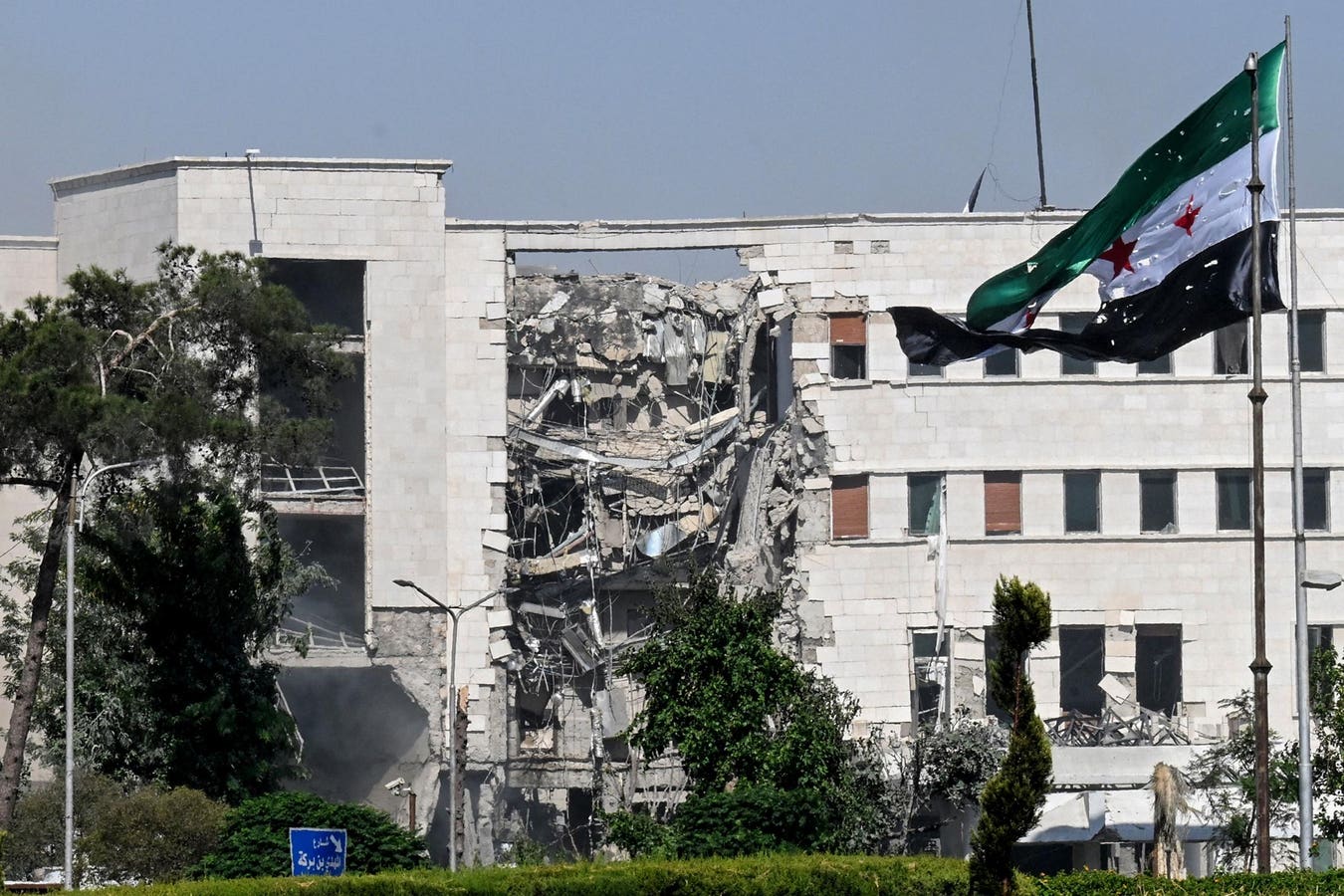A picture shows a view of the damage following Israeli strikes on the Syrian army and defence … More
Israel’s unprecedented airstrikes against Syria’s capital, Damascus, on Wednesday are demonstrative of its proven capability to strike capitals throughout the wider region with relative impunity. From Beirut and Damascus to its north, to Sanaa and Tehran to its southeast and east, Israel has executed successive unprecedented airstrikes in the multiple and ongoing post-October 2023 regional wars.
After heavy explosions captured live on television dramatically rocked Damascus on Wednesday, Israel confirmed it had struck the headquarters of the Syrian military and a “military target” in “the area of the presidential palace” overlooking the capital. Israel justified these strikes as a necessary measure to protect Syria’s Druze minority against the incumbent Syrian transitional government’s military intervention in southwestern Sweida province, amidst local clashes between Druze and Bedouin in recent days.
Shortly after the present Islamist-rooted government in Damascus replaced former President Bashar al-Assad’s regime last December, Israel repeatedly warned it would militarily intervene if the Druze were threatened. It also demanded that southern Syria, where its military swiftly expanded its presence beyond the 1974 buffer zone on the Golan Heights, become a demilitarized zone. Consequently, it began hitting STG forces, including tanks, in Sweida on Monday before Wednesday’s unprecedented strikes in the heart of Damascus.
Israel has bombed targets in Damascus before, during Syria’s devastating civil war that began in 2011, when it routinely attacked suspected Iran-linked targets across the country. However, it never hit high-value government and military targets with such ferocity. While it had at times hinted it might destroy the presidential palace during Assad’s rule, it never actually targeted the enormous compound until Wednesday.
After Assad fell, Israel swiftly launched an enormous countrywide air campaign targeting the remnants of his military stockpiles. The latest strikes, which began on Monday, are undoubtedly the most intense against the new government’s armed forces.
It was clear long before Wednesday, and even the civil war, that Israel could strike Damascus if it decided to do so. After all, the Syrian capital sits a mere 40 miles from the Golan Heights. And since Israel expanded into southern Syria in December, its troops occupy the peak of Mount Hermon, where they can look down on the Syrian capital on a clear day.
Still, these strikes are yet another dramatic reminder of the reach of Israel’s air force. In neighboring Lebanon, Israel conducted the most extensive campaign against Hezbollah in its air forces’ history hitherto in September 2024. Aside from hitting Beirut with impunity, hardly an unprecedented capability in light of historical wars in Lebanon, Israel proved capable of assassinating Hezbollah’s veteran leader, Hassan Nasrallah, in his bunker by air on September 27. Nasrallah’s death was undoubtedly a devastating blow for Iran’s regional militia proxy axis.
Despite a ceasefire in place since November 2024, Israel has intermittently continued strikes against targets in Beirut. It also dispatched fighter jets to fly low over Nasrallah’s funeral on February 23, aptly demonstrating complete air supremacy.
While Damascus and Beirut are close, Israel also targeted capital cities much further afield. In May, it bombed the main international airport in Yemen’s Houthi-controlled capital, Sanaa, destroying all the commercial aircraft there. The Yemeni capital is over 1,600 miles away from Israel, necessitating in-flight refueling for air force jets. Furthermore, as the United States experienced during its brief but intensive air campaign in Yemen earlier this year, the Houthis possess air defenses that even managed to threaten a fifth-generation F-35 Lightning II stealth strike fighter.
Then came Israel’s June air campaign against Iran. Codenamed Rising Lion, that operation saw Israel swiftly achieve air superiority across Iran in a campaign that targeted military, nuclear sites, and political targets throughout the country without losing a single crewed fighter and only a handful of drones.
The campaign saw Iranian cities, especially the capital Tehran, endure a level of bombardment not seen since the Iran-Iraq War and even exceeding that in significant ways. Footage from June 15, released after the war, showing cars on a crowded street flung into the air after a missile impact, aptly demonstrated the impunity with which Israel could strike the Iranian capital.
It’s possible and even likely that Beirut, Damascus, Sanaa, and Tehran will endure more Israeli airstrikes in the future.
Interestingly, one major regional capital city has managed to avoid such punitive strikes despite hosting Iran-backed elements, which have targeted Israel.
While its airspace was repeatedly violated during the June 12-day Israel-Iran War, Iraq managed to stay out of that conflict. It complained to the United Nations about an overflight of 50 Israeli warplanes en route to Iran but did little else.
During that war, Israel reportedly warned Baghdad directly that it would incur “harsh and painful” strikes in response to any attack launched on Israel from Iraqi soil. Furthermore, Iraqi authorities believed becoming involved could have proven more existential for the country than even the Islamic State group was at the height of its power in 2014.
Following the onset of the Gaza war in October 2023, Iran-backed Iraqi paramilitaries launched drones and cruise missiles from Iraqi soil at Israel, as did many other Iran-backed militias, and targeted U.S. bases in Iraq and Syria.
However, swift U.S. retaliation, particularly in February 2024, against these group’s leadership targets and Israeli threats to retaliate against them saw such attacks cease. Since at least late last year, the political leadership in Baghdad has sought to keep Iraq out of this regional conflagration, cognizant that an Israeli attack could devastate the country militarily and economically, and possibly even topple the government.
Consequently, at least for now, Baghdad has avoided punishing strikes like those three other Arab capitals and Tehran.




